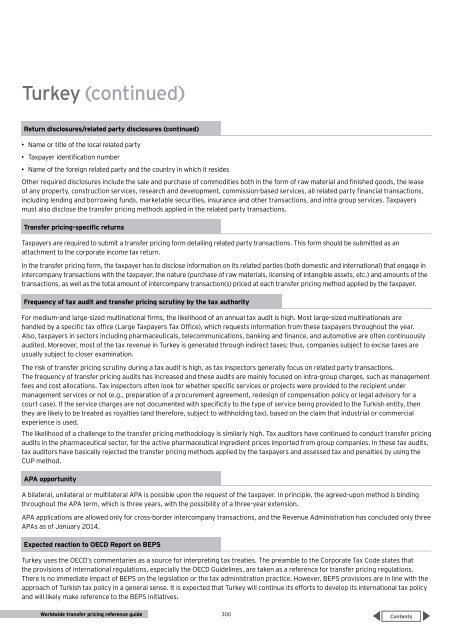Worldwide transfer pricing reference guide 2014
You also want an ePaper? Increase the reach of your titles
YUMPU automatically turns print PDFs into web optimized ePapers that Google loves.
Turkey (continued)<br />
Return disclosures/related party disclosures (continued)<br />
• Name or title of the local related party<br />
• Taxpayer identification number<br />
• Name of the foreign related party and the country in which it resides<br />
Other required disclosures include the sale and purchase of commodities both in the form of raw material and finished goods, the lease<br />
of any property, construction services, research and development, commission-based services, all related party financial transactions,<br />
including lending and borrowing funds, marketable securities, insurance and other transactions, and intra group services. Taxpayers<br />
must also disclose the <strong>transfer</strong> <strong>pricing</strong> methods applied in the related party transactions.<br />
Transfer <strong>pricing</strong>-specific returns<br />
Taxpayers are required to submit a <strong>transfer</strong> <strong>pricing</strong> form detailing related party transactions. This form should be submitted as an<br />
attachment to the corporate income tax return.<br />
In the <strong>transfer</strong> <strong>pricing</strong> form, the taxpayer has to disclose information on its related parties (both domestic and international) that engage in<br />
intercompany transactions with the taxpayer, the nature (purchase of raw materials, licensing of intangible assets, etc.) and amounts of the<br />
transactions, as well as the total amount of intercompany transaction(s) priced at each <strong>transfer</strong> <strong>pricing</strong> method applied by the taxpayer.<br />
Frequency of tax audit and <strong>transfer</strong> <strong>pricing</strong> scrutiny by the tax authority<br />
For medium-and large-sized multinational firms, the likelihood of an annual tax audit is high. Most large-sized multinationals are<br />
handled by a specific tax office (Large Taxpayers Tax Office), which requests information from these taxpayers throughout the year.<br />
Also, taxpayers in sectors including pharmaceuticals, telecommunications, banking and finance, and automotive are often continuously<br />
audited. Moreover, most of the tax revenue in Turkey is generated through indirect taxes; thus, companies subject to excise taxes are<br />
usually subject to closer examination.<br />
The risk of <strong>transfer</strong> <strong>pricing</strong> scrutiny during a tax audit is high, as tax inspectors generally focus on related party transactions.<br />
The frequency of <strong>transfer</strong> <strong>pricing</strong> audits has increased and these audits are mainly focused on intra-group charges, such as management<br />
fees and cost allocations. Tax inspectors often look for whether specific services or projects were provided to the recipient under<br />
management services or not (e.g., preparation of a procurement agreement, redesign of compensation policy or legal advisory for a<br />
court case). If the service charges are not documented with specificity to the type of service being provided to the Turkish entity, then<br />
they are likely to be treated as royalties (and therefore, subject to withholding tax), based on the claim that industrial or commercial<br />
experience is used.<br />
The likelihood of a challenge to the <strong>transfer</strong> <strong>pricing</strong> methodology is similarly high. Tax auditors have continued to conduct <strong>transfer</strong> <strong>pricing</strong><br />
audits in the pharmaceutical sector, for the active pharmaceutical ingredient prices imported from group companies. In these tax audits,<br />
tax auditors have basically rejected the <strong>transfer</strong> <strong>pricing</strong> methods applied by the taxpayers and assessed tax and penalties by using the<br />
CUP method.<br />
APA opportunity<br />
A bilateral, unilateral or multilateral APA is possible upon the request of the taxpayer. In principle, the agreed-upon method is binding<br />
throughout the APA term, which is three years, with the possibility of a three-year extension.<br />
APA applications are allowed only for cross-border intercompany transactions, and the Revenue Administration has concluded only three<br />
APAs as of January <strong>2014</strong>.<br />
Expected reaction to OECD Report on BEPS<br />
Turkey uses the OECD’s commentaries as a source for interpreting tax treaties. The preamble to the Corporate Tax Code states that<br />
the provisions of international regulations, especially the OECD Guidelines, are taken as a <strong>reference</strong> for <strong>transfer</strong> <strong>pricing</strong> regulations.<br />
There is no immediate impact of BEPS on the legislation or the tax administration practice. However, BEPS provisions are in line with the<br />
approach of Turkish tax policy in a general sense. It is expected that Turkey will continue its efforts to develop its international tax policy<br />
and will likely make <strong>reference</strong> to the BEPS initiatives.<br />
<strong>Worldwide</strong> <strong>transfer</strong> <strong>pricing</strong> <strong>reference</strong> <strong>guide</strong><br />
300


